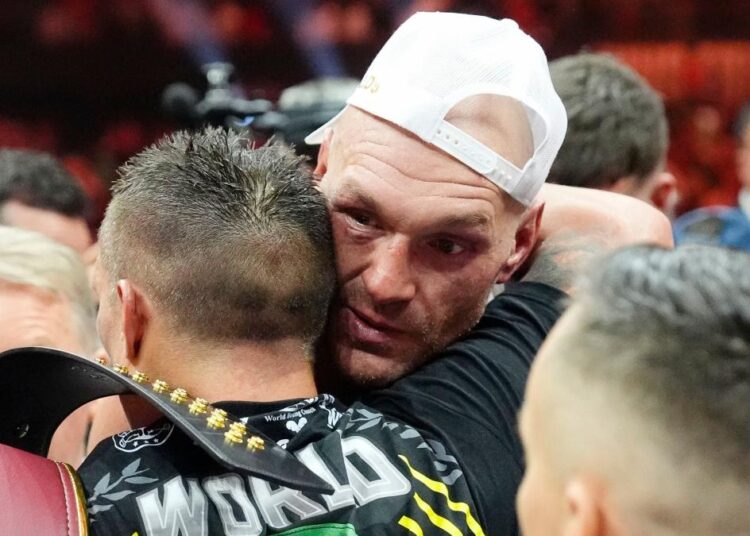It is almost inevitable a professional boxer – no matter how good they are – will come unstuck at some point.
Perhaps you are thrown in too deep against an experienced operator early in your career, maybe father time eventually catches up or – in Tyson Fury’s case – you are pitted against a generational great like Oleksandr Usyk.
For the first time in a 35-fight career, Briton Fury was defeated when he was outpointed by Usyk in May.
“It was what it was, I tried my best in there,” a bruised yet upbeat Fury said afterwards.
It is rare for an elite fighter to reach the end of an illustrious career without feeling the pain of a loss, though Rocky Marciano, Floyd Mayweather, Andre Ward and Joe Calzaghe are exceptions to the rule.
Yet an undefeated record adds so much weight in modern-day boxing. The cloak of invincibility disappeared from Anthony Joshua when he suffered a shock defeat to Andy Ruiz Jr in 2019. For all Amir Khan achieved in the sport, the loss early on in his career to Breidis Prescott defined him for a number of years.
BBC Sport speaks to past and present boxers to find out how much importance they put on staying undefeated and how they bounced back from “losing the 0”.
‘My father’s death put things into perspective’ – Nathan Heaney
“My immediate reaction was that I felt like a let the whole city down and that I didn’t want to go back to being a teacher. Rationality kind of goes out of the window and you fear the worst. But my fans who have supported me throughout my career all stayed in the arena and were chanting “there’s only one Nathan Heaney” – I couldn’t believe it.
“After a few weeks I decided to crack on. My dad had taken his own life weeks before my first title fight and I had to get over that grief; which really does put it into perspective. I love boxing, it means the world to me, but it is just a sport. I knew where I went wrong and I’ve learned from the defeat.”
‘I got back in the ring as soon as possible’ – Richie Woodhall
“All boxers are scared of losing and every fighter thinks they’re better than what they are. So when you stay undefeated you are in a situation where you don’t think it will end. Then when that time comes, it can be a big shock to the system.
“For me, the best way to deal with it was to get back in the ring as soon as I could. I knew I was good enough to win a world title so I was training after an operation on my elbow and my mind was reset. Two fights later, became world champion.”
‘I’d be getting on with my day and suddenly start crying’ – Shannon Ryan
“I feel like I handled the defeat with grace, more than I thought I would. But it took me about two weeks to get over it. I didn’t know what to do. I would get thoughts like ‘is my career done?’ I’d be getting on with my day and suddenly start crying.
“But my mantra is ‘trust the process’ and ‘everything happens for a reason’ which allowed me to get through that hardship. I know that loss was meant for me to elevate me on my journey.”
‘I was inexperienced but avenged the defeat’ – Kevin Lerena
“I don’t really count my first loss as a loss. I was a youngster with no experience but I came back and knocked Muller out so I learned from it and it was so important for my development.
“My defeat to Dubois is what I consider my first real adversity. I’d never been on the canvas before in my career and I realised what it was like to lose at the highest level. I also had to cope with the trauma of losing a fight I was winning.
“I’ve since gone on to become the WBC bridgerweight champion, so the most important lesson I learned to to turn any loss into the biggest victories in your life.”
‘It was a robbery, I was furious’ – Hannah Rankin
“My first loss was so early on in my career and an absolute robbery. Everyone had me as the winner. I wasn’t demotivated, I was just absolutely furious and determined to get back in the ring and show everyone that it shouldn’t have been a defeat.
“The most important loss for me was against WBA champion Alicia Napoleon in New York when I stepped up to super-middleweight. It was at world-title level and cemented to me that I belong at that level. I just needed to work harder and push myself. It lit a fire in my belly and I realised you always learn more from a loss than you do for a win.”
‘I’m undefeated but not scared of losing’ – Moses Itauma
“I don’t pay any attention to my undefeated record – it means nothing. When I look at a fighter’s record and see one or two losses, I feel like they’ve had a proper career. When someone is 33-0 it might sound good but it means they haven’t overcome adversity.
“You have to take your hat off to someone like Anthony Joshua who has come back from losing fights. It’s part of the game. The likes of George Foreman and Muhammad Ali, lost fights but that’s what made them great and shows they’ve overcome adversity.
“I’m not saying I want losses on my record but if it happens it happens. I’m not going into a fight to lose but you have good days and bad days, that’s boxing.”
More boxing from the BBC
Read the full article here


























